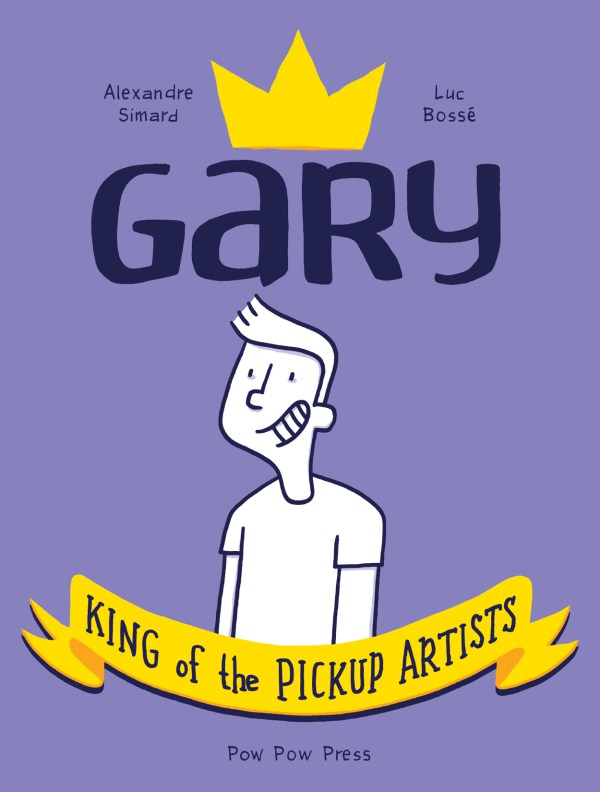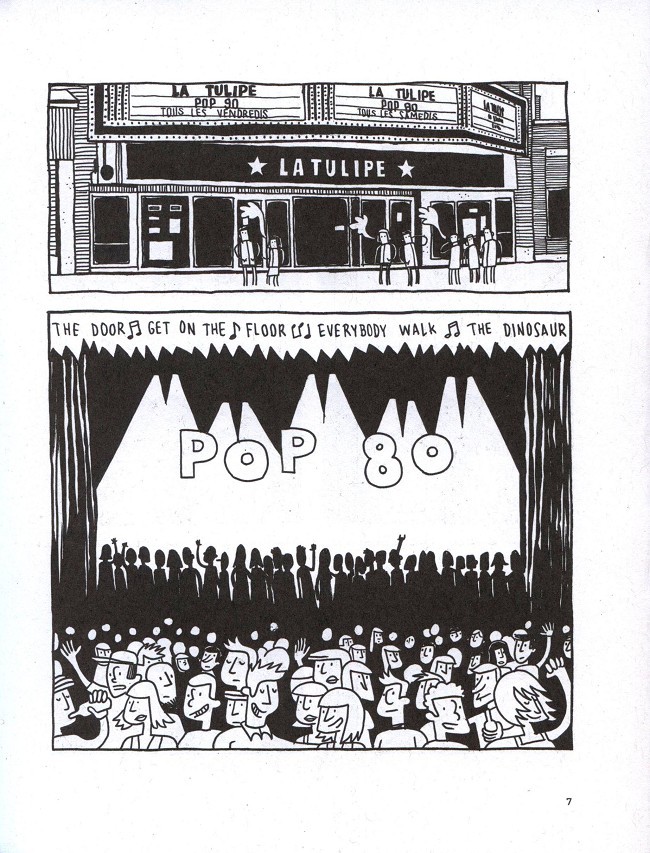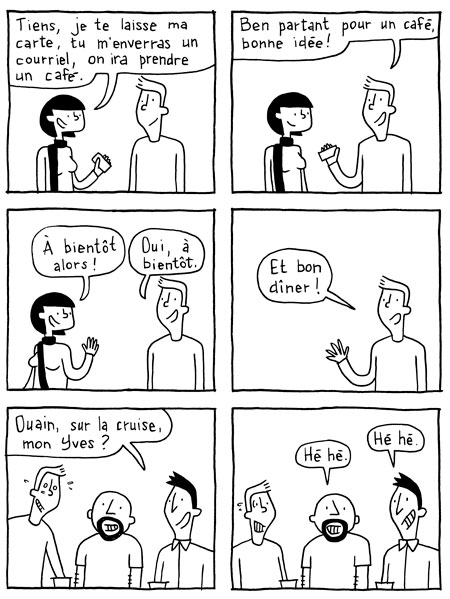The Toronto Comic Arts Festival is one of the most influential and important comic book event in North America. It’s mission is to “promote the creators of comic books in their broad and diverse voices, for the betterment of the medium of comics”. In the spirit of this mission, the Comics Beat has conducted a series of interview with some of the phenomenal cartoonists in attendance at this year’s festival. The Comics Beat will be releasing a series of interview with cartoonist in attendance. We hope that these interviews will improve our understanding of these creators voices, techniques, interests and influences.
Alexandre Simard is a French-Canadian writer and web developer. Though he hasn’t written a lot of comic books, he has written Yves, le roi de la cruise, the first comic book that Pow Pow Press published back in 2010. It was received with great acclaim, winning the “best comic” at Exposine that year. The book will be released for the first time in English with a new more English title (Gary, King of the Pick Up Artists) and I’ve spoken with Alexandre about his work, his interest in romantic comedy and miscommunication as well as the upcoming translation of his book.
—
Philippe Leblanc: For those readers who may not be familiar with you and your work, can you tell us a little bit about yourself?
Alexandre Simard: This is the hardest question for me to answer. I know how cliché impostor’s syndrome sounds but I have difficulty thinking of myself as a writer, much less a comics artist. I have written just one book and I can’t even draw! I earn my living as a web developer. I have a love/hate relationship with this job, meaning that every 2 or 3 years, I quit and try a different environment (from agency to freelance, from freelance to startup) and every 10 years or so, I consider abandoning the field completely. My work in comics is limited to Yves, le roi de la cruise, now available in English as Gary, King of the Pick Up Artists. You could say it’s a romantic comedy in which the comedy is at the expense of the main character and the romance is more cringe-worthy than endearing. I live alone and I actually do enjoy long walks on the beach.
PL: You’ve studied cinema. I’m curious to know how comic books mesh with your career path.
AS: As a child and a teenager, I loved books. I was an avid reader and would relish any creative writing assignment. Then as a young adult, my best friend’s influence got me into movies. I remember a summer during which Cinéma Outremont was showing classic films for one dollar per screening. We were there every day. A year later, we were studying cinema in college. Everyone wrote a few screenplays, but only a handful were actually produced. Mine weren’t. Making movies (even short, low-budget ones) requires collaboration from many people. I was more of a divisive figure than a leader and soon after graduation, I realized that I should forget about directing my own movies. I hung on a little longer to the idea of being a screenplay writer, but I never wrote another complete movie script after my studies, so I forgot about that too. In the meantime, the same friend who got me into movies introduced me to « grown up » comics. Sure, I had read a ton of Franco-Belgian comics in my youth, but a whole new world opened in front of me: Frank Miller and Adrian Tomine on this side of the pond, Trondheim and L’Association on the other. I never became the collector my friend was, but I happily pilfered his stuff for many years.
Much later, when Luc Bossé approached me with the idea of him drawing some of my stories, all my screenplay writing knowledge and experience came rushing back to me. I wrote for him what was essentially a movie script, both in form and function: scene locations, description of the action, dialogs and that’s it. Everything else was up to Luc, who wore all the hats of a movie production team. In a sense, making a comic book is the only I will ever get to make a movie. Working with a big team of people is not for me. Working with one true friend; That, I can do. And just to be clear, I’m not saying a comic book is the consolation prize to a film. Even though I wrote it like a screenplay, Yves was always a book in my mind.
PL: Gary, King of the Pick Up Artists is a comic book following the life of Gary, a nice guy who’s a bit clueless to show his feelings to the women he meets. How did you come up with this idea for your comic book?
AS: There is a large part of autobiography in Gary. I think that’s fairly common for a first book. It’s a mix of barely disguised personal anecdotes, others I imagined while in situations similar to those in the book and some actually original (gasp!) stories. There are even a few small bits of Luc’s love life in there. Luc also played a large part in the birth of the project. We were both blogging at the time (it was a while ago!), him in comics form, me in written form. Both of us represented our own lives. Luc drew himself as a character, along with his girlfriend, some of his friends and family members. My writing was more of a journal, where I tried (and presumably failed) to keep other people anonymous. We had a discussion on the subject of using real life in stories and realized we were both at a point where we were starting to feel uncomfortable with it. Luc told me: « If you can write me real stories, with characters and intrigue, I’d be interested in drawing them. »
PL: Your main character Gary has a lot of difficulty finding true love. He seems unaware of the social cues of people around him. What interested you in exploring this theme of miscommunication and misunderstanding?
AS: Gary is a lot like me in my mid-twenties. I was in my thirties when I wrote the book, so there was enough distance for me to understand him very well. His handling of interpersonal clues is faulty in both directions. He can be as oblivious to real signs directed at him as he is obsessive about signs he’s imagining. What triggers him in either direction? Whether he is attracted to the other person. This attraction is decided very early on and in a superficial manner. He finds the girl cute? Cue the internal dialogue and insecurity. He doesn’t? Girl becomes invisible. In both cases, he ends up with a skewed perception of what is actually going on, which causes many an awkward moment. Those awkward moments are Luc and I’s favorite parts of the book. We enjoy seeing him squirm and suffer. Since he’s is a fictional version of me, I guess that means the answer to your question is: masochism.
PL: I really like the style of this book. The characters are showing emotions and complexity quite well. You’ve collaborated with Luc Bossé for this comic book. How did find the experience of collaboration?
AS: Thank you for the compliment. It’s especially meaningful to me because in the beginning, Gary, King of the Pick Up Artists was just a collection of short stories. It’s only about mid-way through that I started working on two book-length story arcs, which allowed me to better flesh out some characters.
Working with Luc was pleasant, playful and essential. I’ve already told the genesis story, but most of the book was also written in Luc’s presence. We would do what we called « office days » during which Luc would draw and I would write. Without those, I’m not sure I would have ever finished the project. Not finishing projects is a pretty consistent staple of my existence and Luc was instrumental in not letting this happen.
On a creative level, since it’s the only comic book I’ve ever written, it’s hard for me to know what’s good, bad or special about the way we worked together. We’re still friends, so that’s a good sign! I’d say each of us wanted to impede the other as little as possible. Luc would rarely if ever comment on the story or dialogues. If he asked for changes, it would be because he wasn’t sure he could correctly communicate what was written through drawing. Conversely, my comments on Luc’s illustration work were mostly centred around what I perceived to be reading comprehension issues. There weren’t many of those. In many cases, Luc actually improved comprehension and comic effect through his careful panel design.
PL: The first volume of Yves, le roi de la cruise will be published in English by Pow Pow Press. Why was it important for you to see this comic translated in English?
AS: For one thing, it gave me the occasion to finish another project, translating the book. It was the first time I did any French-to-English translation and I appreciated the challenge. Obviously, it would have been reckless to leave this task alone to a French language born and bred translation newbie. Luc enlisted the help of Rupert Bottenberg to review and proof my translation. Rupert was a joy to work with and helped me iron out non-native language tics.
I am also hoping it will expose the book to more critics. The original French version was one of the first two books published by Pow Pow. Pow Pow being a newcomer on the scene, it meant the book did not get a lot of media exposure. Being in the press is not an objective for me, but I would love to read the opinion of a greater number of professional critics.
PL: You are currently working with Luc Bossé on a sequel called Yves, fidèle à lui-même. What can we expect from this new comic?
AS: More of the same, yet different?
—
You can get Gary, King of the Pick Up Artists over at the Pow Pow Press store.
Come meet Alexandre in person at TCAF. He’s not as awkward as the protagonists he writes!











